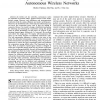97 search results - page 19 / 20 » Bounding the power rate function of wireless ad hoc networks |
TWC
2008
13 years 7 months ago
2008
In wireless ad hoc networks, autonomous nodes are reluctant to forward others' packets because of the nodes' limited energy. However, such selfishness and noncooperation ...
WINET
2010
13 years 5 months ago
2010
Abstract Algorithms for scheduling TDMA transmissions in multi-hop networks usually determine the smallest length conflict-free assignment of slots in which each link or node is a...
INFOCOM
2006
IEEE
14 years 1 months ago
2006
IEEE
— We consider the fundamental delay tradeoffs for minimizing energy expenditure in a multi-user wireless downlink with randomly varying channels. First, we extend the BerryGallag...
PERCOM
2003
ACM
14 years 7 months ago
2003
ACM
Pervasive computing applications are increasingly leveraging contextual information from several sources to provide users with behavior appropriate to the environment in which the...
MOBIHOC
2006
ACM
14 years 7 months ago
2006
ACM
To date, topology control in wireless ad hoc and sensor networks--the study of how to compute from the given communication network a subgraph with certain beneficial properties--h...

